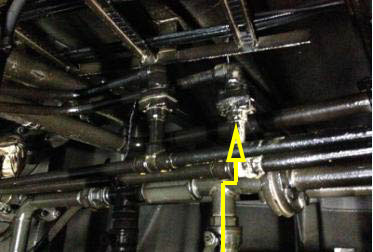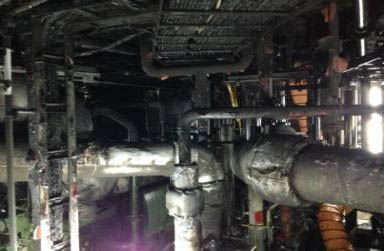Engine room fire
A member has reported an incident in which an engine room fire occurred onboard a tug. The incident occurred after an un-berthing operation of another vessel which had been alongside in port. The tug was safely moored alongside with three duty personnel onboard (chief officer, second engineer and deckhand). The master and chief engineer were ashore.
The chief officer in the wheelhouse sighted smoke coming from both the engine room side vents, towards the bows of the tug. Subsequently, the second engineer called the wheelhouse requesting for the starboard main engine to be shut down immediately. Both main engines were then stopped by the chief officer. At this point in time, the second engineer had made his escape from the engine control room to the main deck.
The fire was brought under control with assistance from local shore-based fire-fighters. Whilst the incident resulted in extensive localised damages to the tug’s engine room, there were no injuries.


Our member’s investigation revealed the following:
- The hydraulic power pack unit for the tug’s deck winch and windlass operations was initially leaking lightly; this became a sudden heavy leakage on the day of the incident (fuel source);
- The port main engine exhaust manifold insulation was leaking with the hot surfaces exposed (heat source);
- The darkened state of the engine room due to the exhaust gas was a hazard that the crews were not aware of;
- Crews did not execute the necessary actions to control the fire such as: – Stop engine room blowers from continuously feeding fire with oxygen – Stop all oil pumps in engine room from running and feeding the fire with hydraulic oil – Close all engine room fire flaps on deck (many were found seized) – Activate the fuel oil quick closing valves (generators were running throughout).
The following lessons were learnt:
- Engine room equipment defects rectified as soon as possible;
- Insulation checks/repairs carried out;
- Ensure all oil lines are in satisfactory conditions;
- Ensure engine room is sufficiently lighted to maintain safe working conditions;
- Ensure all engine room fire flaps on deck are in safe working condition;
- Ensure all emergency shutdown trips are tested at regular intervals by the ship’s crew;
- Ensure monthly fire drills are carried out on board and that all crew are familiarised with the emergency duties/equipment’s operations.
Our member reiterated that:
- Crew Members are all responsible for their own safety;
- Crew members need to be willing to approach others about working safely and ‘stopping the job’;
- Crew need to be properly informed about risk and control measures.
Engine room fires form a recurring theme in IMCA safety flashes. Typically the root causes of such fires are failures in house-keeping or planned maintenance, or failure to recognise fire hazards and address the risks. members may wish to refer to the following similar incidents (key words: engine, room, fire)
Safety Event
Published: 14 July 2014
Download: /home/storm/sites/dev-imca-int-com-1/public/wp-content/themes/imca-website-2020/single-safety-events.php on line 55
">
IMCA Safety Flashes
Submit a Report
IMCA Safety Flashes summarise key safety matters and incidents, allowing lessons to be more easily learnt for the benefit of all. The effectiveness of the IMCA Safety Flash system depends on Members sharing information and so avoiding repeat incidents. Please consider adding safetyreports@imca-int.com to your internal distribution list for safety alerts or manually submitting information on incidents you consider may be relevant. All information is anonymised or sanitised, as appropriate.
IMCA’s store terms and conditions (https://www.imca-int.com/legal-notices/terms/) apply to all downloads from IMCA’s website, including this document.
IMCA makes every effort to ensure the accuracy and reliability of the data contained in the documents it publishes, but IMCA shall not be liable for any guidance and/or recommendation and/or statement herein contained. The information contained in this document does not fulfil or replace any individual’s or Member's legal, regulatory or other duties or obligations in respect of their operations. Individuals and Members remain solely responsible for the safe, lawful and proper conduct of their operations.
